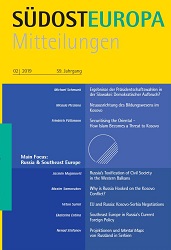Russia’s Toxification of Civil Society in the Western Balkans
Russia’s Toxification of Civil Society in the Western Balkans
Author(s): Jasmin MujanovićSubject(s): Civil Society, Geopolitics
Published by: Südosteuropa Gesellschaft e.V.
Keywords: Russia; Western Balkans;Civil society;
Summary/Abstract: From an ideological perspective, Russia’s activities in Southeast Europe, and especially in the Western Balkans, are geared towards creating alternative frameworks of political legitimacy for Moscow’s partner governments in the region. Through such efforts Russia seeks to entice these and other local actors to shift their political, economic, and security allegiances towards Moscow, and away from Brussels and Washington. Even if Russia does not – and cannot – offer the kinds of cohesive institutional linkages and socio-economic benefits the EU (and the Atlantic community more broadly) can, the strategy is nevertheless effective because it concentrates on the venal and personal interests of local elites, not the well-being of citizens in the countries. Rather than trying and failing to advance the principles of good governance, this is an entirely parallel approach that actively privileges the interests of elites over those of the public at large. In short, Moscow invests in strongman regimes to advance its strategic aims in the region –above all, disrupting EU and NATO enlargement and cohesion within the Western Balkans.
Journal: Südosteuropa Mitteilungen
- Issue Year: 2019
- Issue No: 02
- Page Range: 49-56
- Page Count: 8
- Language: English
- Content File-PDF

